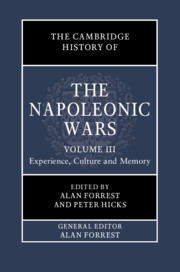Book contents
- The Cambridge History of the Napoleonic Wars
- The Cambridge History of the Napoleonic Wars
- The Cambridge History of the Napoleonic Wars
- Copyright page
- Contents
- Figures
- Maps
- Contributors to Volume III
- Introduction to Volume III
- Part I The Experience of War
- 1 The Soldiers’ Experience of War
- 2 Military Values: Heroism and Masculinity
- 3 Military Medicine
- 4 Women and the Home Front
- 5 Prisoners of War
- Part II The Experience of Imperial Rule
- Part III War, Culture and Memory
- Part IV The Aftermath and Legacy of the Wars
- Bibliographic Essays
- Index
3 - Military Medicine
from Part I - The Experience of War
Published online by Cambridge University Press: 05 August 2022
- The Cambridge History of the Napoleonic Wars
- The Cambridge History of the Napoleonic Wars
- The Cambridge History of the Napoleonic Wars
- Copyright page
- Contents
- Figures
- Maps
- Contributors to Volume III
- Introduction to Volume III
- Part I The Experience of War
- 1 The Soldiers’ Experience of War
- 2 Military Values: Heroism and Masculinity
- 3 Military Medicine
- 4 Women and the Home Front
- 5 Prisoners of War
- Part II The Experience of Imperial Rule
- Part III War, Culture and Memory
- Part IV The Aftermath and Legacy of the Wars
- Bibliographic Essays
- Index
Summary
The soldiers of Valmy, Austerlitz, Eylau and Waterloo marched to war out of a civilian world that was squalid, impoverished and dangerous. A contemporary observer of the poorer parts of Paris saw an overcrowded city perfused by the stench of household animals, excrement and carcasses. People lived and ate under a visible haze of thick ‘fetid’ air. There were catastrophic levels of infant mortality and, on the eve of the Revolution, overall life expectancy was twenty-eight years. The citizens of France’s greatest enemy were no better off. In London, more than half of the deaths were in children under five years and old age was a rare cause of mortality, less common than afflictions such as tuberculosis, fevers, smallpox and ‘convulsions’. The medical care in both capitals was rudimentary. In the Hôtel Dieu in 1788 it was commonplace to cram as many beds as possible into one room and to put up to six people into each bed. The Westminster Hospital was prone to flooding and notorious for fevers, malaria, typhoid and infectious diarrhoea.
- Type
- Chapter
- Information
- The Cambridge History of the Napoleonic Wars , pp. 50 - 72Publisher: Cambridge University PressPrint publication year: 2022



